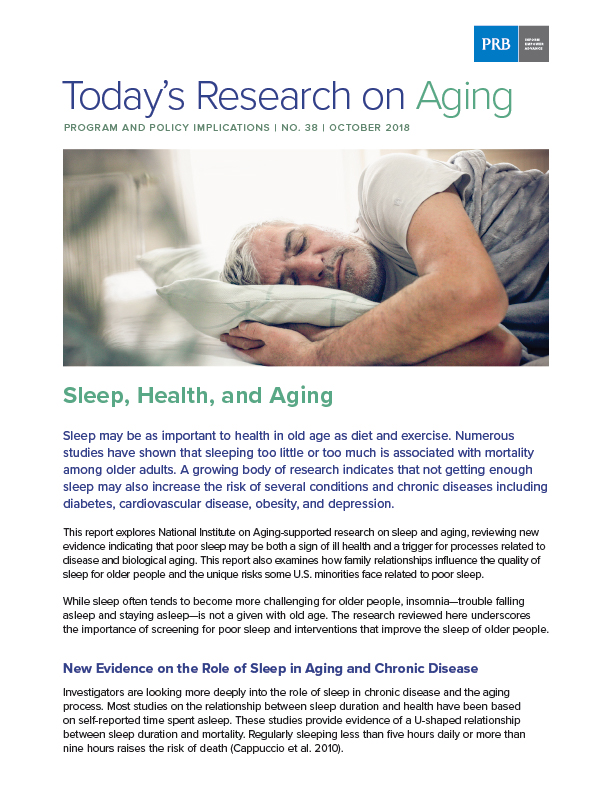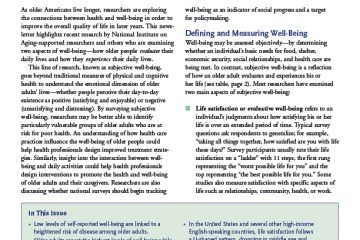
New Evidence on Sleep’s Role in Aging and Chronic Disease
Sleep may be as important to health in old age as diet and exercise. Numerous studies have shown that sleeping too much or too little is associated with mortality among older adults.
A growing body of research indicates that not getting enough sleep may also increase the risk of several conditions and chronic diseases including diabetes, cardiovascular disease, obesity, and depression.
This issue of PRB’s Today’s Research on Aging (Issue 38) explores National Institute on Aging-supported research on sleep and aging, reviewing new evidence indicating that poor sleep may be both a sign of ill health and a trigger for processes related to disease and biological aging.
While sleep often tends to become more challenging for older people, insomnia—trouble falling asleep and staying asleep—is not a given with old age. The research examined here underscores the importance of screening for poor sleep and interventions that improve the sleep of older people.
Poor Sleep Linked to Biological Aging
Investigators are looking more deeply into the role of sleep in chronic disease and the aging process. Most studies on the relationship between sleep duration and health have been based on self-reported time spent asleep. These studies provide evidence of a U-shaped relationship between sleep duration and mortality: Regularly sleeping less than five hours daily or more than nine hours raises the risk of death.1
However, analysis of electronic sleep assessment data—gathered over multiple nights using wrist bands (actigraphy)—offers a more nuanced view. Diane Lauderdale of the University of Chicago and colleagues find sleeping less than six hours per night is associated with poor or fair health among older people but sleeping longer than average is not linked to any negative health consequences.2 Their study is based on sleep data for more than 700 adults ages 62 to 90 participating in the nationally representative National Social Life, Health, and Aging Project (NSHAP). As use of “actigraphy matures, our understanding of how sleep affects health may change,” they write.
A University of California, Los Angeles team finds that one night of partial sleep deprivation activates genes related to biological aging in older adults.3 For the study, 29 older adults between ages 61 and 86 spent four nights in a sleep laboratory. Following two uninterrupted nights of sleep, participants were not allowed to sleep between 11 p.m. and 3 a.m. and later awakened at 7 a.m. Researchers monitored their sleep and drew blood daily.
After a night partially deprived of sleep, participants’ blood showed signs of deterioration in the cell’s growth and division cycle. The researchers report that these findings “causally link sleep deprivation to the molecular processes associated with biological aging,” suggesting that insufficient sleep may increase the risk of chronic disease by “activating the molecular pathways that drive biological aging.”
Michael Irwin, Richard Olmstead, and Judith Carroll of the University of California, Los Angeles, find further evidence of the effect of sleep on the aging process by analyzing results from 72 distinct studies. This body of research—involving 50,000 participants in both clinical settings and the wider population—suggests that sleep disturbances (poor sleep or insomnia complaints) and long sleep duration (sleeping more than eight hours regularly) are related to increases in blood markers of inflammation.
Specifically, disturbed sleep and too much sleep are associated with the inflammation markers C-reactive protein (CRP) and interleukin-6 (IL-6). These markers tend to be related to chronic conditions such as diabetes and cardiovascular disease. Previous research shows that treating insomnia can reduce inflammation. The researchers argue that sleep disturbance and long sleep duration should be viewed as additional risk factors for inflammation that can be modified, like high-fat diets and sedentary lifestyles. For example, several studies show that insomnia treatments can reduce inflammation markers, offering evidence that sleep problems can be a cause of inflammation.4
Sleep Problems Are Often Related to Depression
Poor sleep is also related to depression in old age, according to several studies.5 A University of Michigan team finds disturbed sleep is associated with depression, regardless of the number of chronic medical conditions a participant has.6> The study tracked more than 3,500 older adults participating in the nationally representative Americans’ Changing Lives Study, which surveyed participants five times over 25 years.
The researchers show that older adults diagnosed with a higher number of chronic medical conditions–such as high blood pressure, diabetes, chronic lung disease, heart attack or other heart trouble, stroke, cancer, and arthritis—have higher levels of depressive symptoms. People sleeping poorly who also have heart trouble face a particularly high risk of having depressive symptoms.
In the researchers’ view, detecting sleep problems early and intervening with medications or behavioral change is crucial, and can have long-term benefits for physical and mental health. They point out that people with depression tend to use more health care services than average, and given high medical costs, early screening and treatment of disturbed sleep may reduce costs and have “enduring public health benefits.”
Severely Disturbed Sleep May Signal Impending Dementia
Severely disturbed sleep may be an early signal of impending dementia, a team of Canadian researchers show.7 Otherwise healthy older people may experience disturbed sleep, including severe insomnia and daytime sleepiness, prior to displaying other dementia-related symptoms, such as memory loss. For the study, the researchers examined the survey responses of more than 28,000 adults ages 50 and older collected through the Survey of Health, Ageing, and Retirement (SHARE) in 12 European countries.
Using data for participants with no symptoms of Alzheimer’s disease or dementia at the beginning of the study, researchers created a sleep disturbance index (based on measures of sleep problems, fatigue, use of sleep medication, trouble sleeping, and changes in sleep patterns). Analysis shows that each separate sleep measure is independently associated with a greater risk of Alzheimer’s disease, dementia, or death within four years. After accounting for overall health, high scores on the sleep disturbance index remain associated with a greater risk of developing dementia.
Dementia is known to profoundly disrupt the sleep-wake cycle of people with the disease and leave them highly active at night, creating a burden for their family caregivers. The researchers recommend that health care providers screen for sleep problems in older people, in order to detect dementia earlier and initiate interventions to potentially prevent or delay institutionalization.
Similarly, researchers at the University of California, Berkeley show that disrupted sleep related to Alzheimer’s disease may be different from or significantly more severe than typical age-related sleep impairment.8 Evaluating older people for sleep changes linked to Alzheimer’s, such as declines in non-rapid eye movement sleep, could be a potentially non-invasive way to identify individuals at risk for Alzheimer’s disease. They suggest that sleep impairment is both “a consequence and cause of the progression of Alzheimer’s disease; one that is modifiable, offering preventative and therapeutic treatment potential.”
Dementia-related brain changes may be linked to regularly sleeping less than six hours per night and may begin in middle age, researchers based in California, Pennsylvania, Alabama, Maryland, and Illinois find.9 More than 600 black and white adults (mean age 45) in the Coronary Artery Risk Development in Young Adults (CARDIA) study reported their typical sleep duration and then had brain MRIs five years later. Compared with those who slept between six and eight hours per night, the brains of short sleepers had a greater concentration of white matter hyperintensities (a hardening of arteries in the brain), which have been linked to stroke and vascular dementia.
Subscribe to our Today’s Research on Aging newsletter by sending an email to todaysresearch@prb.org with ‘Subscribe’ in the subject line.
References
[1] Francesco Cappuccio et al., “Sleep Duration and All-Cause Mortality: A Systematic Review and Meta-Analysis of Prospective Studies,” SLEEP 33, no. 5 (2010): 585-92.
[2] Diane Lauderdale et al., “Sleep Duration and Health Among Older Adults: Associations Vary by How Sleep Is Measured, Journal of Epidemiology and Community Health 70, no. 4 (2016): 361-6.
[3] Judith E. Carroll et al., “Partial Sleep Deprivation Activates the DNA Damage Response (DDR) and the Senescence-Associated Secretory Phenotype (SASP) in Aged Adult Humans,” Brain, Behavior, and Immunity 51, no. 1 (2016): 223-9.
[4] Michael R. Irwin et al., “Cognitive Behavioral Therapy and Tai Chi Reverse Cellular and Genomic Markers of Inflammation in Late-Life Insomnia: A Randomized Controlled Trial,” Biological Psychiatry 78, no. 1 (2015): 721-9; and Michael R. Irwin at al., “Cognitive Behavioral Therapy vs. Tai Chi for Late-Life Insomnia and Inflammatory Risk: A Randomized Controlled Comparative Efficacy Trial,” SLEEP 37, no. 1 (2014): 1543-52.
[5] Eun Lee et al., “Persistent Sleep Disturbance: A Risk Factor for Recurrent Depression in Community-Dwelling Older Adults,” SLEEP 36, no. 11 (2013): 1685-91.
[6] Amanda Leggett et al., “The Effect of Sleep Disturbance on the Association Between Chronic Medical Conditions and Depressive Symptoms Over Time,” Longitudinal and Life Course Studies 8, no. 2 (2017): 138-51.
[7] Roxanne Sterniczuk et al., “Sleep Disturbance Is Associated With Incident Dementia and Mortality,” Current Alzheimer Research 10, no. 7 (2013): 765-75.
[8] Bryce Mander et al., “Sleep: A Novel Mechanistic Pathway, Biomarker, and Treatment Target in the Pathology of Alzheimer’s Disease?” Neuron 39, no. 8 (2016): 552-6.
[9] Kristine Yaffe et al., “Sleep Duration and White Matter Quality in Middle-Aged Adults,” SLEEP 39, no. 9 (2016): 1743-47.

 ">
">


